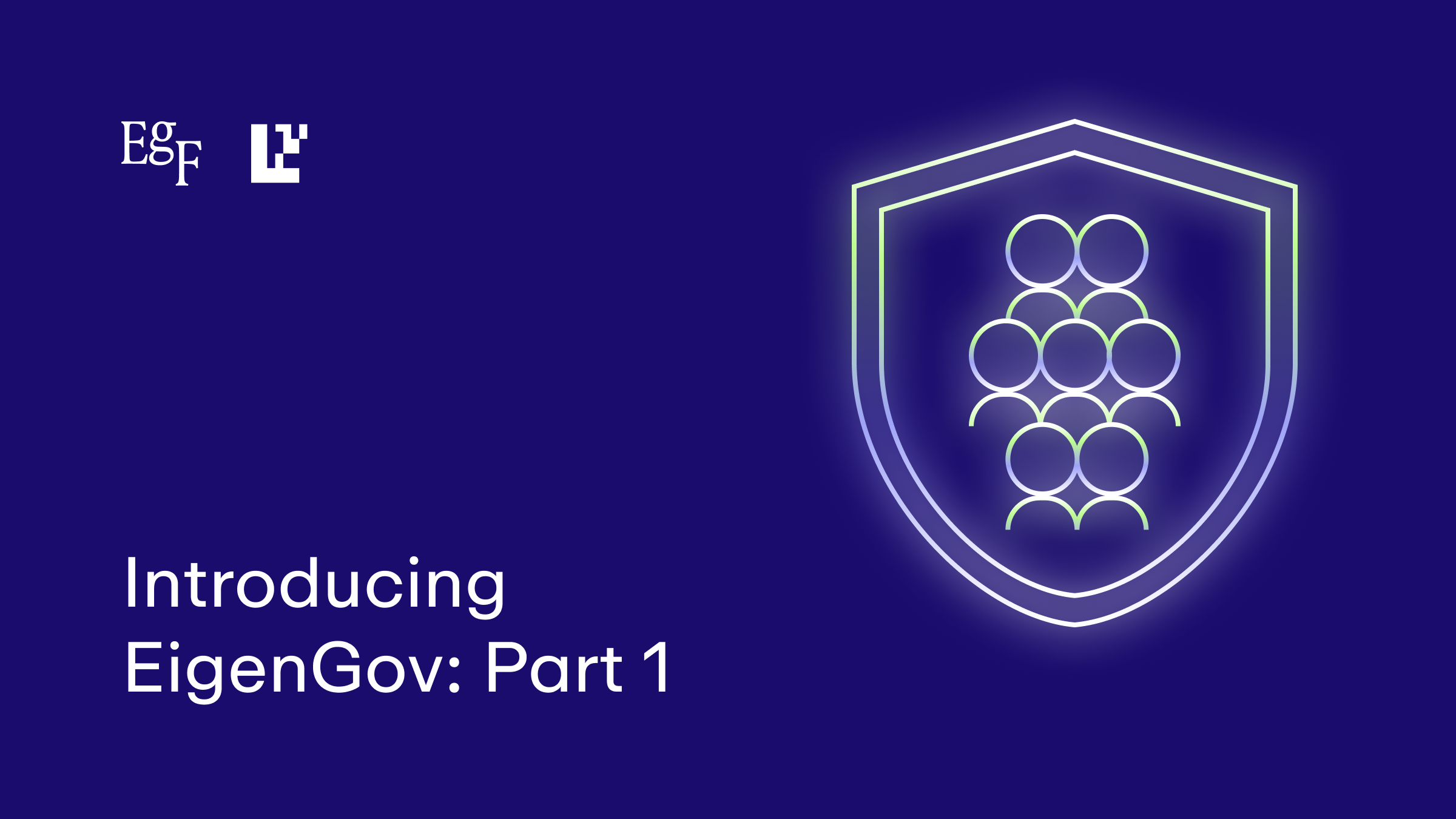Introducing EigenGov: Part 1

The foundations of EigenGov, EigenLayer’s governance platform
In a previous blog post about the Eigen Foundation’s role in progressive decentralization, we briefly introduced EigenGov, EigenLayer’s governance system. Today, we’d like to share some of our big picture thinking about decentralized governance and how we plan to implement it in service of the EigenLayer protocol and community.
These ideas will form the foundation of EigenGov V1.
EigenLayer’s 'coordination engine' facilitates trustless cooperation across a wide range of participants. This engine is central to our mission of creating an ecosystem of open innovation and supporting the global shared security commons.
The role of EigenGov is to maintain a coordination layer for the EigenLayer ecosystem of EIGEN holders, AVS developers, operators, and stakers who are key participants in the prosperity, security, and reliability of the EigenLayer protocol. EigenGov brings our ecosystem participants together to support our common vision of open innovation through a novel system designed to be both effective and decentralized.
The Governed Should Govern
DAOs have transformed protocol governance by enabling open participation, and we stand on the shoulders of the governance systems that came before us. Their contributions have established a new status quo in crypto. In the spirit of the open-source software movement, they have offered useful ideas and models that can serve as a baseline in launching new ideas and innovations. Even with governance advancements from just a few years ago, there is an opportunity to enhance the coordination and commitment systems that most of us agree are falling short of certain fundamental governance objectives.
Many DAOs today acknowledge the critical challenge: governance must be credibly decentralized and able to make high-context or complex decisions at scale while also ensuring the security, capture-resistance, and proper operation of the protocol being governed. Some existing governance models meet aspects of the challenge but fail on other dimensions.
We seek to address this challenge through substantial innovations to traditional tokenholder governance models, which will be described in a series of blog posts to follow. However, we start here with the well-established, shared principle that the governed should govern. In EigenGov, the stakeholders building in the EigenLayer ecosystem and actively utilizing services should be the ones driving day-to-day decision-making. This means even in the absence of direct tokenholder voting (as discussed below), the ultimate power exercised in EigenGov will derive its legitimacy from EIGEN holders.
The Initial Building Blocks
Everyone in the EigenLayer ecosystem has the capacity to add substantive value to the collective. The role of governance is to help make the connections to correctly match capacities to opportunities and allow decentralized contributions to flourish.
Councils Make Decisions
The heart of EigenGov V1 is its councils. Power in EigenGov will be held by a network of councils composed of trusted, high-context domain experts empowered by tokenholders to make decisions on behalf of the community and held accountable through a system of checks and balances. The councils will have specific domain authority to make decisions and take actions with respect to the EigenLayer protocol and EigenGov. These include decision-making authorities and powers to upgrade the core protocol contracts (Protocol Council), administer rewards parameters (Incentives Council), administer a community grants budget (Grants Council), and establish limitations on, and evaluate, governance and governance powers (Eigen Council).
Each council will have a charter governing its scope of decision-making power and authority, and in time, these initial councils will expand in their number, scope of activities, and membership.
EIGEN Holders Have Ultimate Authority
EIGEN holders will have the authority to veto council decisions.
In the near future, Eigen holders also will be able to (i) directly endorse EigenLayer contributors with respect to certain subject-matter knowledge or skills that may qualify such contributors for council membership and/or (ii) assign authorities to “curators” that will make such endorsements on behalf of those Eigen holders who assigned authority to them. This “endorsements” model is novel and should be distinguished from delegation. Often in DAOs, tokenholders transfer their total voting power, regardless of context, to delegates who then vote on proposals, which can be vetoed by councils. EigenGov inverts this relationship to one we believe will be much more effective. Decision-makers who hold the community’s confidence are elevated to councils and actively vote on all proposals. Proposals can be vetoed as needed by tokenholders as a check on strongly misaligned decisions.
Furthermore, tokenholders will be able to signal on proposals prior to council votes, enhancing collective input without requiring detailed expertise on every issue. This keeps councils in check and elevates the most qualified and trusted talent.
Incubation of Decentralized Structures
We have a lot of work to do to ensure a resilient, transparent, and decentralized network of councils. To solve the challenge of effective and decentralized governance, the Eigen Foundation is implementing a philosophy of incubation for creating, appointing, and stewarding councils.
Initially, we will incubate decentralized structures as independent councils within the Eigen Foundation. Incubation ensures effective council operations in the near term. It also provides time to research, develop, test and iterate on new council and governance designs. These designs will launch robust, decentralized solutions for key issues such as:
- Council Incentivization: Rewarding council members for sustained, high-quality, and long-term value creation.
- Council Alignment: Reducing principal-agent problems by creating new systems to support decentralized alignment of decision-makers and protocol needs.
- Council Accountability: Keeping decision-makers accountable to tokenholders through checks and balances, transparency, and reporting.
Once we have systems in place to address these concerns, councils will stand on their own.
Version-Controlled Governance
EigenGov’s ultimate goal is to become efficient, agile, and secure enough to remain resilient and functional into the future. In order to meet the challenge of stewarding a governance system that is simultaneously minimal, secure, and stable for immediate operation while also fostering open innovation and experimentation, we’ve applied a dual-track software development approach we call Core and Vision.
Core: A stable, production-ready governance branch, focused on simplicity, especially initially, and ongoing on understandability, robustness and security, all at scale, to ensure steady operation.
Vision: An experimental branch exploring governance innovations in a controlled environment. Once validated, these improvements are production commitments into Core, continuously enhancing EigenGov.
As an example of Visions track work, recall that we mentioned the goal for EigenGov to bring together our ecosystem participants. EIGEN holders, AVS developers, operators, and stakers are all key participants in the prosperity, security, and reliability of the EigenLayer protocol. While this initial launch of EigenGov focuses on the role of Eigen tokenholders, part of the Vision track work is to explore significant governance roles that we will add for other ecosystem participants.
Conclusion
Decentralized and effective governance of networks like EigenLayer remains in its infancy. Past DAO systems and mechanisms have been great at showing what works or not and why. With that learning, we’re seeking to find a new way, and we want to do that with you, the broader governance community, and collaboratively develop EigenGov as a modular, open-source commons that all can learn from and use. We hope to attract the best minds in governance to build a better future through working openly on the most challenging problems, supporting researchers, and improving decentralized governance for the world — all while giving the EigenLayer community unparalleled ownership and control over the EigenLayer protocol.
We look forward to sharing more in our next post, Part 2.
Official Links:
- EIGEN Summary Blog Post: blog.eigenlayer.xyz/eigen
- EIGEN Whitepaper: eigen.eigenlayer.xyz
- FAQ: https://docs.eigenfoundation.org
- Blog: blog.eigenfoundation.org
- X: @eigenfoundation
- Website: eigenfoundation.org
Legal
THIS IS NOT AN OFFER TO SELL OR THE SOLICITATION OF AN OFFER TO PURCHASE ANY EIGEN, AND IS NOT AN OFFERING, ADVERTISEMENT, SOLICITATION, CONFIRMATION, STATEMENT OR ANY FINANCIAL PROMOTION THAT CAN BE CONSTRUED AS AN INVITATION OR INDUCEMENT TO ENGAGE IN ANY INVESTMENT ACTIVITY OR SIMILAR. YOU SHOULD NOT RELY ON THE CONTENT HEREIN FOR ADVICE OF ANY KIND, INCLUDING LEGAL, INVESTMENT, FINANCIAL, TAX, OR OTHER PROFESSIONAL ADVICE, AND SUCH CONTENT IS NOT A SUBSTITUTE FOR ADVICE FROM A QUALIFIED PROFESSIONAL.
THIS DOCUMENT CONTAINS HYPOTHETICAL, FORWARD-LOOKING, AND/OR PROJECTED FIGURES, WHICH ARE NOT GUARANTEED AND ARE SUBJECT TO CHANGE; ACTUAL NUMBERS MAY VARY. EIGEN FOUNDATION AND ITS SUBSIDIARIES MAKE NO REPRESENTATION OR WARRANTY, EXPRESS OR IMPLIED, AS TO THE COMPLETENESS, RELIABILITY, VALIDITY, OR ACCURACY OF THIS INFORMATION. THE CONTENT HEREIN IS NOT ERROR-FREE AND MAY CONTAIN INCORRECT INFORMATION. YOU AGREE AND ACKNOWLEDGE THAT ANY INFORMATION CONTAINED HEREIN IS SUBJECT TO CHANGE WITHOUT NOTICE. NO ADVICE OR INFORMATION, WHETHER ORAL OR WRITTEN, OBTAINED FROM EIGEN FOUNDATION, WILL BE CONSTRUED TO CREATE ANY WARRANTY OR REPRESENTATION NOT EXPRESSLY MADE HEREIN.
FOR ADDITIONAL INFORMATION, PLEASE REFER TO EIGEN FOUNDATION’S TERMS OF SERVICE, PRIVACY POLICY, AND AIRDROP TERMS OF SERVICE.

